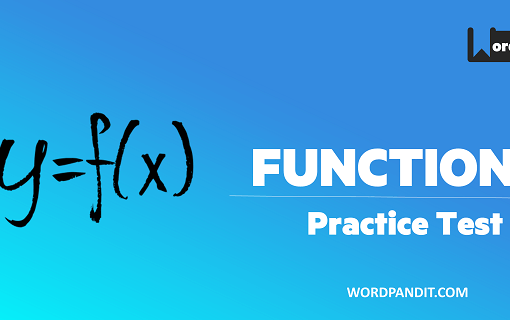- This is an assessment test.
- To draw maximum benefit, study the concepts for the topic concerned.
- Kindly take the tests in this series with a pre-defined schedule.
Algebra: Functions Test-6
Congratulations - you have completed Algebra: Functions Test-6.You scored %%SCORE%% out of %%TOTAL%%.You correct answer percentage: %%PERCENTAGE%% .Your performance has been rated as %%RATING%%
Your answers are highlighted below.
Question 1 |
x and y are non-zero real numbers
f (x, y) = + (x +y)0.5,if (x +y)0.5is real otherwise = (x +y)2
g (x, y) = (x +y)2 if (x + y)0.5is real, otherwise =- (x +y)
If f(x, y) =g (x, y) then
f (x, y) = + (x +y)0.5,if (x +y)0.5is real otherwise = (x +y)2
g (x, y) = (x +y)2 if (x + y)0.5is real, otherwise =- (x +y)
If f(x, y) =g (x, y) then
x=y | |
x+y= 1 | |
x+y=-2 | |
Both b and c |
Question 1 Explanation:
Going through all the options
The value of x and y could be anything so cant be sure about the functions
In this case ,f (x, y) = + (x +y)0.5 g (x, y) = (x +y)2
In this case both are 1
So f(x, y) =g (x, y)
The value of x and y could be anything so cant be sure about the functions
In this case ,f (x, y) = + (x +y)0.5 g (x, y) = (x +y)2
In this case both are 1
So f(x, y) =g (x, y)
Question 2 |
y=ax+b | |
y=a+bx+cx2 | |
y=eax+b | |
None of these |
Question 2 Explanation:
(a) Can be eliminated as looking at the data we can conclude that there is no linear relation between x and y
(b) Using the various values of x and y we can create the following equations
4=a+b+c -----------(1)
6=a+2b+4c---------(2)
14=a+3b+9c--------(3)
22=a+4b+16c
32=a+5b+25c
44=a+6b+36c
We will find the values of a,b and c using the first 3 equations and will check if the values satisfy the other 3 equations
Using eq 1 and 2 we get
2=b+3c
Using 2 and 3 we get
8=b+5c
Solving we get c=3,b=-7 and a=8
The values of a, b and c satisfy all the equations to a large limit.
(c) As the exponential function grows more quickly for small positive values as compared to large values,
while quite the opposite is happening here. So can’t be a match
(b) Using the various values of x and y we can create the following equations
4=a+b+c -----------(1)
6=a+2b+4c---------(2)
14=a+3b+9c--------(3)
22=a+4b+16c
32=a+5b+25c
44=a+6b+36c
We will find the values of a,b and c using the first 3 equations and will check if the values satisfy the other 3 equations
Using eq 1 and 2 we get
2=b+3c
Using 2 and 3 we get
8=b+5c
Solving we get c=3,b=-7 and a=8
The values of a, b and c satisfy all the equations to a large limit.
(c) As the exponential function grows more quickly for small positive values as compared to large values,
while quite the opposite is happening here. So can’t be a match
Question 3 |
If f(0, y) = y + 1, and f(x + I, y) =f (x, f (x, y)). Then, what is the value of f(1,2) ?
1 | |
2 | |
3 | |
4 |
Question 3 Explanation:
F(1,2)=f(0,3)
F(0,3)=4
So,f(1,2)=4
Question 4 |
Functions m and M are defined as follows:m (a, b, c) = min (a + b, c, a)M(a, b, c) = max (a + b, c, a)If a = - 2, b = - 3 and c = 2 what is the maximum between
$ \displaystyle \left[ \frac{m\text{ }\left( a,\text{ }b,\text{ }c \right)+M\text{ }\left( a,\text{ }b,\text{ }c \right)}{2} \right]and\left[ \frac{m\text{ }\left( a,\text{ }b,\text{ }c \right)\text{ }M\text{ }\left( a,\text{ }b,\text{ }c \right)}{2} \right]$
3/2 | |
7/2 | |
-3/2 | |
-7/2 |
Question 4 Explanation:
[m (a, b, c)+M (a, b, c)]/2=-3/2
[m (a, b, c) –M (a, b, c)]/2=-7/2
Max of the 2 is -3/2 which is the answer
Question 5 |
Functions m and M are defined as follows:
m (a, b, c) = min (a + b, c, a)
M(a, b, c) = max (a + b, c, a)If a b, and c are negative, then what gives the minimum of a and b
m (a,b,c) | |
–M (-a, a,-b) | |
m (a+b, b,c) | |
None of these |
Question 5 Explanation:
As all a,b and c are negative
(a) m (a,b,c)=min(a+b,c,a)
(b) –M (-a, a,-b)=-max(0,-b,-a)
(c) m (a+b, b,c)=min(a+2b,c,a+b)
(a) m (a,b,c)=min(a+b,c,a)
(b) –M (-a, a,-b)=-max(0,-b,-a)
(c) m (a+b, b,c)=min(a+2b,c,a+b)
Once you are finished, click the button below. Any items you have not completed will be marked incorrect.
There are 5 questions to complete.
List |













